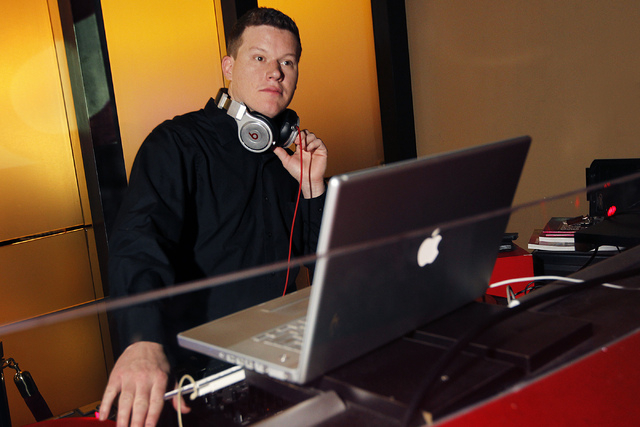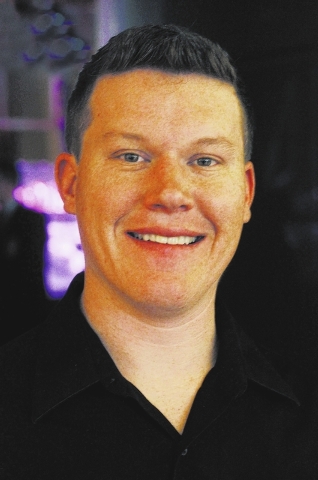Professional DJ plays the songs he thinks the crowd would like to hear
Those who listened closely to the background music at the Las Vegas Global Economic Alliance annual dinner would have picked up on the unusual French lyrics.
For disc jockey Harry Nelson, who professionally goes by Harry O, the music created a hurdle he rarely sees. A full-time DJ since 2007, he has concentrated on weddings and normally taps into a long playlist for the tunes that get people on the dance floor.
For the business crowd, however, he knew that he needed to switch gears and stick to background music. So he combed the Internet for foreign music with the right combination of sound and lyrics — he read Google translations — that would please crowd members, or at least not offend them.
“I had only two things to draw on, international and background music,” he said. “It was harder than any other event because I did not have that music. They had all the flags up and wanted it to be worldly, so they wanted anything with a foreign accent that would be recognized as different.
“The challenge would have been if everyone in the room had been paying more attention. So I was just creating a vibe.”
Finding the right vibe with recorded music has grown in importance in Las Vegas, so much that celebrity DJs now have billboards just like Strip headliners or Cirque du Soleil.
Nelson hasn’t moved into megaclubs, but said the growing fame of some DJs has helped raise the profile of the entire profession. In addition, he wants to book more corporate gigs and create original productions to broaden his income base beyond the weekend-heavy weddings, something that has become more important after recently taking on a home mortgage for the first time.
“Can I be a full-time wedding DJ? The answer is yes,” he said. “But can I be a full-time wedding DJ and be able to afford a lot of additional equipment? There is nothing like having extra income.”
Nelson had danced with numerous shows for more than a decade, including some in Las Vegas, before giving up the gypsy lifestyle and settling down in one place. Being a DJ allowed him to do that yet remain in entertainment and tap into his musical background.
Today, he maintains the same goal with a subtle twist.
“If five years from now I am still DJing full time and still own my own home,” he said, “then I can really feel like I have made it.”
Question: Is a stage name such as Harry O almost a requirement for a DJ?
Answer: As with anything, marketing is a big factor. A lot of times I go to a bridal show or a networking event and people say, “Hey, Harry O!” It definitely works and it is easy to remember. So if you can come up with anything catchy, it’s going to help. If you just have an event and the DJ is Harry Nelson or just Harry — some people come up to me at a wedding and tell me they thought I would be an older gentleman because they stereotype the name — it is an old-fashioned name. Having a great DJ name is a definite plus.
I’m Norwegian and O is my middle initial for Olaf. It was a high school nickname, Harry O. When it came time to come up with my DJ name, it just seemed like a no-brainer.
Question: Does it mean much to you that some DJs have become stars in their own right?
Answer: I do like the fact that there are billboards all over town. I do like the fact that there are reports coming out about how much these DJs are making. It helps all DJs at the end of the day because it is creating awareness. It is making the DJ business bigger, giving it celebrity status.
At the same time, a lot of club DJs have taken a cut. I didn’t experience it because I’m doing private events. But all of my local DJ friends did because the clubs are paying so much out (to the big names) that they had to increase all the covers and lower all the other DJs’ pay. They once might have made $500 a shift on a Friday or Saturday, but now it’s more like $250 in an environment that is literally making millions and millions and millions of dollars.
Question: Does the potential stardom attract a lot of people?
Answer: It is a tough industry because it has become saturated. We are experiencing it in the nightclubs. We are experiencing it in the private events. I think Las Vegas needs to continue to look at other cities and see what makes them tick and tock and step up.
Question: Doesn’t pay count heavily with events?
Answer: I receive a ton of inquiries and of course the No. 1 question is, what’s your price. But it’s a service, a talent-based industry. You can hire a DJ and you can say this is the music we want. Like anything, in order to do a great job you have to go beyond just playing music. You have to be able to read the crowd. You have to have a sense of timing. Of course, you have to be professional and reliable and click with different personalities. If you are at a private event, you will get people of all ages and some who are drinking. How do you handle those people who are a little obnoxious. You’ve got to keep a cool demeanor. At the end of the day, you are there to please everyone.
The first thing I do is encourage them to set the price aside for a minute. Let’s just get to know each other before you close the door. It’s not about how much money you have but what you do with the money that makes all the difference. More important than the fee is whether I am going to do a great job.
Question: How long did it take you to learn to read a crowd?
Answer: Not very long because of my experience in dance and theater. I already had an extensive knowledge of music and already knew about the different sounds and where they came from.
Question: How do you know what to play for a group?
Answer: I ask questions like how many guests you will have there, what’s the average age, where’s everyone coming from, what your parents like, what close relatives are like so you can satisfy some of the key players. But I also encourage them not to provide too much information because a DJ should be able to walk into a room, look at everybody and start to build a play list in his mind based on their ages, how they dress and other things and get a feel for what type of music these people will most likely enjoy. Reading the crowd is so, so important and often overlooked.
In the world of private events, an important part of being a DJ is being a great host. If you can walk away from an event as best friends with everybody and they are calling you by name, now you are talking. The music alone won’t do that.
Question: Why not take a lot of requests?
Answer: That is self-serving. You could be a kiosk with everyone pushing buttons, a jukebox. You know you are doing an exceptional job when you are getting few requests because they are on the dance floor the whole time. You are on the same page with the crowd. But if there is a problem, I will fade out a track. Don’t let a bad thing go and go and go. Get out of it and switch it up. When you play it too safe, that can be a bad thing. You have to be gutsy and go for it.
Question: You don’t have a business background. How did you learn that part?
Answer: I just figured I would start my company and learn as I go. I didn’t even know how to work a cash register. I was pretty spoiled.
Do I want to do all the business side, with the estimated taxes and all the other details that go into running a small business? The answer is no. But do I have what it takes to put up with the business side and make it all work because I love DJing so much that I don’t mind tackling the business world in order to make it happen.
Contact reporter Tim O’Reiley at toreiley@reviewjournal.com or at 702-387-5290.


















